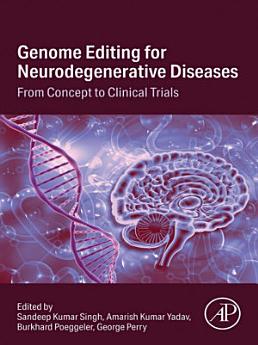Genome Editing for Neurodegenerative Diseases: From Concept to Clinical Trials
About this ebook
About the author
Assistant Professor in Department of Medical Biotechnology at the All India Institute of Medical Sciences, Nagpur. He is researcher and neuroscientist with a strong background in Biochemistry and Biomedicine. His research interests are in neurodegenerative diseases and has ~12 years of experience. He’s a member of editorial boards of several international journals related to neuroscience and member of several scientific societies. Dr. Singh has been appointed as Bentham Ambassador by Bentham Science Publisher (USA). He is a speaker at several scientific national and international conferences/symposium/workshops in India and abroad.
Dr. Amarish K Yadav is a postdoctoral research scholar at North Carolina State University. His current research interest is developing gene-drive systems using CRISPR/Cas9 in Drosophila suzukii. After obtaining his master’s degree in biotechnology, he was awarded his Ph.D. from Banaras Hindu University in 2017. He has worked in collaboration with many neuroscientists and researchers to understand the molecular mechanisms of Alzheimer’s and Parkinson’s diseases progression and therapeutics. Dr. Yadav has published his research findings in peer-reviewed journals and has also authored a book chapter on neurodegenerative diseases modeling in drosophila. Dr. Yadav has participated and presented his research work at various national and international conferences and symposia.
Dr. Burkhard Poeggeler is affiliated with the Georg-August-University Göttingen and works primarily on the biochemistry and pharmacology of regeneration by antioxidant protection and trophic prosurvival signaling. His research focusses on bioenergetic agents such as nitric oxide and on redox regulation such as neurovascular coupling. Together with many other distinguished scientists he investigates the unique nootropic, neurotrophic and neuroprotective activity of melatonin and related tryptophan metabolites based on their potent antioxidant, anti-inflammatory antiamyloidogenic effects such as amyloid clearance by the glymphatic system, the connective tissue, the interstitium and the gastrointestinal tract. Based on the exploration of these protective agents, he works on developing new possibilities to extend human health and life span. He is widely published with over 120 PubMed listed publications.
Dr. George Perry, Ph.D. Professor of Biology and Chemistry Semmes Foundation Distinguished University Chair in Neurobiology He is a neuroscientist known for his work on neuronal oxidation of nucleic acids in Alzheimer's disease. He is distinguished as one of the top Alzheimer’s disease researchers with over 1000 publications, won numerous awards, and is one of the top 100 most-cited scientists.







